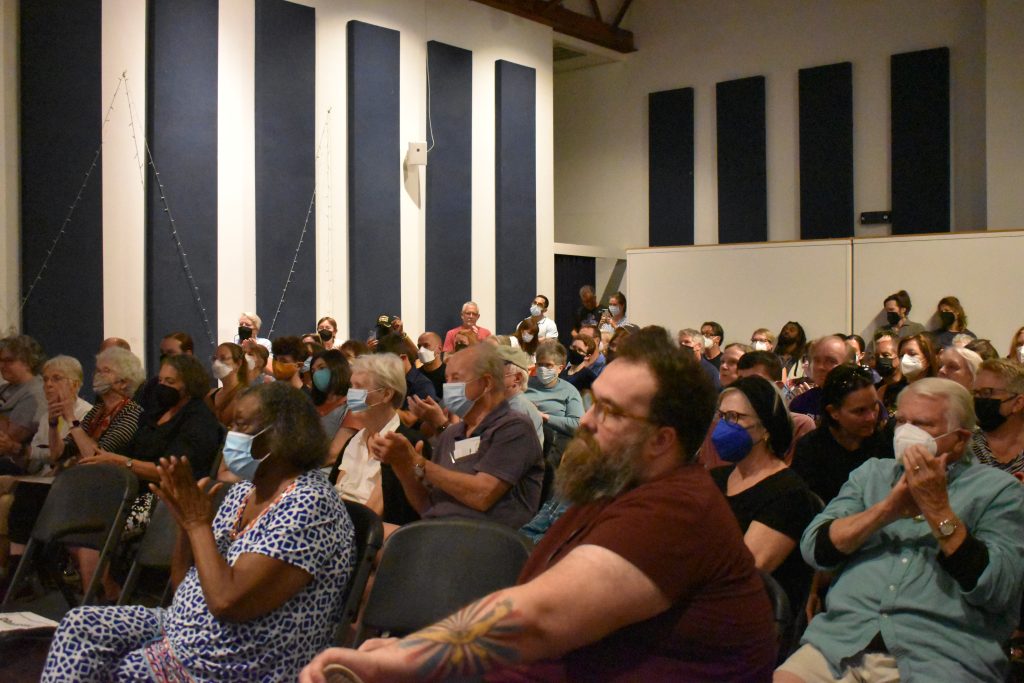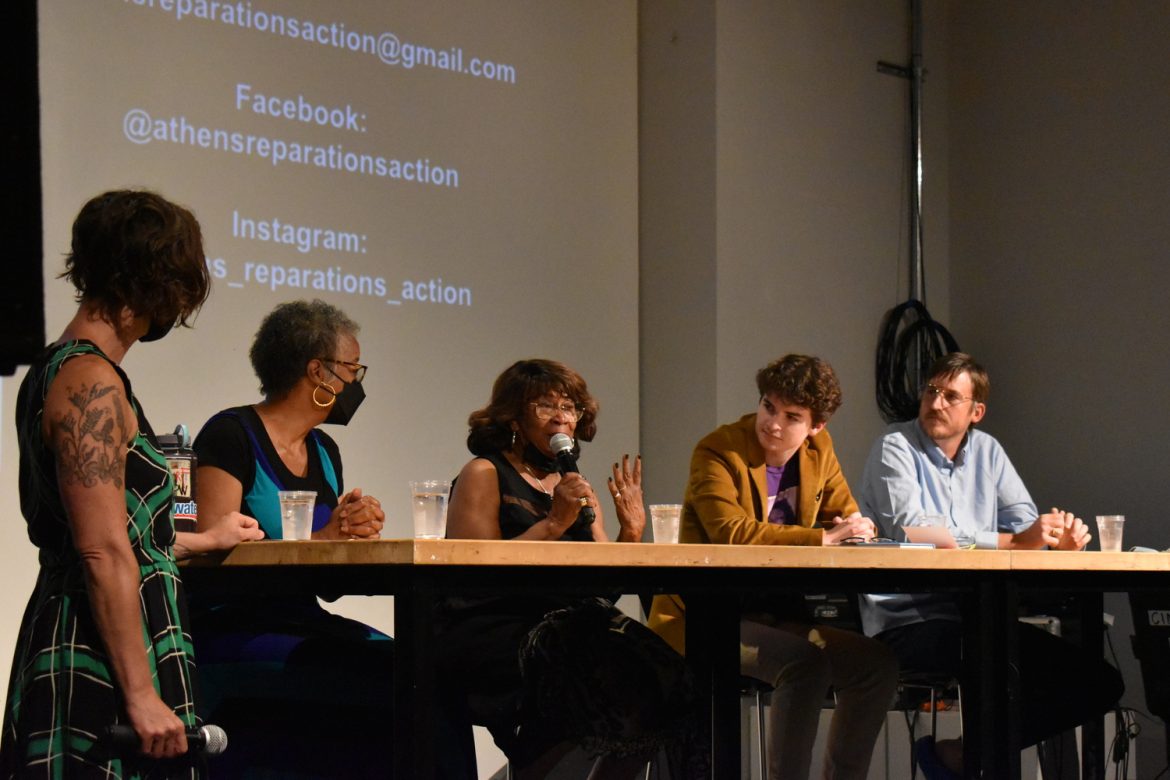Athens Reparations President Alys Willman, Linnentown first descendents Hattie Thomas Whitehead and Christine Davis, “Linnentown: Urban renewal, white supremacy and the University of Georgia” creator Alex Benoit and Clarke County District Seven Commissioner Russell Edwards take part in a panel discussion while Davis answers a question on Aug. 15. Davis was a little girl when she and her mother were forced out of their home in Linnentown. “To watch (the documentary), it brought back a lot of memories. Linnentown was just like a family,” Davis said. “When (Linnentown was destroyed) it was devastating because my mother was single, my father had passed and it was just us in the house.” Photo by Cadence Schapker
The Linnentown Documentary and Panel event was held at Ciné on Aug. 15 by Athens Reparations Action and featured a showing of the documentary “Linnentown: urban renewal, white supremacy and the University of Georgia” as well as a panel discussion.
Community members came together on Aug. 15 for the Linnentown Documentary and Panel event to stand witness to the history of Linnentown — a Black community in Athens that was displaced through gentrification by the University of Georgia in the 1960’s – and talk about action being taken towards recognition and reparations for Linnentown descendents.
The event, held by Athens Reparations Actions at Ciné, featured a showing of the documentary “Linnentown: Urban renewal, white supremacy and the University of Georgia” followed by a panel discussion led by ARA President Alys Willman. The panel also included the documentary’s creator, Oconee County High School 2020 alumnus and Harvard student Alex Benoit, as well as Linnentown first descendents Hattie Thomas Whitehead and Christine Davis and Clarke County District Seven Commissioner Russell Edwards.

Audience members applaud at the Linnentown Documentary and Panel event at Ciné on Aug. 15. The event was hosted by Athens Reparations Action and was centered around the history of Linnentown – a Black community in Athens that was displaced through gentrification by the University of Georgia in the 1960’s – featuring a documentary and panel discussion. “Changing the world means actually getting your neighbors and your co-workers together to fight for the people who have had no power and to share power with them. I’ve got all the ideas, I’ve got all the places to plug you in, (but) I can’t do it (alone),” ARA labor organizer Joey Carter said in the panel discussion. Photo by Cadence Schapker
“We’re here tonight to witness what happened in our town and our community. And we’re here to remember that and to commit ourselves to understanding the full story,” Willman said in the panel discussion.
Clarke Central High School English department teacher and ARA member Dr. Thomas Drewry sparked the idea for the event when he connected the ARA with Benoit, a former student of his, after seeing Benoit’s work on “Linnentown: Urban renewal, white supremacy and the University of Georgia.”
“(Benoit) shared this documentary and I forwarded it to people in our group. They kind of ran with it and we coordinated with (Benoit) to try to get him to have a screening to kick off our organization because we’re so new,” Drewry said. “(Thomas Whitehead) and others put together a panel so that we can discuss the documentary afterwards. I feel lots of warmth in my heart when you have former students doing good work like this.”
Audience member and UGA student Justin Wells found the information presented through the documentary and panel to be shocking and hopes to be more mindful and raise awareness about Linnentown in the future.
“(Linnentown) will be in my mind a lot more everywhere I go. I’ll be walking around campus and seeing names like (Richard B. Russell) or other names of white supremacists (thinking) ‘Why are they still there? Why do we have the journalism building named after a white supremacist?’” Wells said. “I definitely do talk to (my friends) about this kind of thing, but knowing about this film, I could definitely tell them that this is something on YouTube that they can access.”
“(Linnentown) will be in my mind a lot more everywhere I go. I’ll be walking around campus and seeing names like (Richard B. Russell) or other names of white supremacists (thinking) ‘Why are they still there? Why do we have the journalism building named after a white supremacist?’”
— Justin Wells,
UGA student
CCHS Class of 1999 alumna and ARA Vice President Chaplain Cole Knapper felt that the event went well and was especially impressed with the magnitude and engagement of the audience.
“I was really surprised by the turnout that we had. It was standing room only in the back so that was powerful. It shows that there’s a community here that is really interested, that really has a thirst for knowledge,” Knapper said. “I feel like the people that came tonight said to themselves, ‘What kind of town (do) we want to live in? What kind of community do we want to have?’ I think that that’s really powerful. It feels really, really good.”
